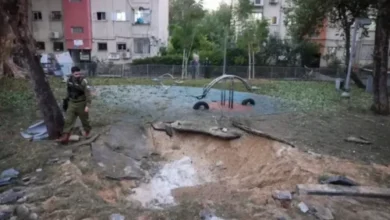SC links non-implementation of Faizabad verdict to May 9 events

The Supreme Court of Pakistan has lamented that the violence continued to be perceived as a permissible means to attain one’s goals as evident from the May 9 incidents.
The remarks made by Chief Justice of Pakistan (CJP) Justice Qazi Faez Isa came as a three-member Supreme Court bench, headed by the CJP, and comprising Justice Athar Minallah and Justice Aminuddin Khan, heard a review petition filed against the SC’s 2019 judgement in the Faizabad sit-in case.
Following Wednesday’s court proceedings, the government announced a three-member commission to identify those who planned, financed, and supported a sit-in at Islamabad’s Faizabad area six years back—a dharna that had brought a little-known religious party, the Tehreek-e-Labbaik Pakistan (TLP), into the national spotlight.
According to the government’s notification, the commission will also recommend legal action against the planners and executors of the protest which disrupted lives in the twin cities Rawalpindi and Islamabad between November 6 and November 27, 2017.
As a result of the protest, the PML-N government had to sack its law minister Zahid Hamid. The Supreme Court had taken suo motu notice of the sit-in on November 21, 2017.
Later, a division bench led by Justice Qazi Faez Isa on February 6, 2019 unveiled its verdict in the sit-in case, criticizing the role of intelligence agencies in the saga. Soon after assuming office of the chief justice of Pakistan (CJP) in September this year, Justice Isa listed for hearing the petitions that had been filed against the SC’s February 2019 verdict.
Read more: Govt forms Faizabad sit-in commission
“This Court vide judgment dated 6 February 2019 (‘the Judgment’) traced the history of orchestrated violent protests in Pakistan (paragraphs 20-23), and sounded a warning for the future,” the written order, authored by the CJP, stated on Thursday.
“However, the concerns expressed by us almost 5 years ago were disregarded by successive governments. Review petitions and applications were filed and these were not fixed for hearing, which hindered the Judgment’s implementation.”
The order said that no responsibility was affixed, nor was anyone held accountable for the violence of the past. “It is not surprising that violence continued to be perceived as a permissible means to attain one’s goals. Victims of those striving for an independent judiciary, an inclusive and tolerant Pakistan were disregarded without justice; the nation suffered the consequences, as evident from the recent events of 9 May 2023,” said Justice Isa.
The written order of the Supreme Court acknowledged the manipulation that took place in the handling of review petitions in the Faizabad sit-in case.
“With humility, and setting an example for others to follow, this Court acknowledges the manipulation resorted to in the Supreme Court by not fixing the said petitions and applications. The Supreme Court endeavours to regain the confidence of the people by acknowledging this, and will be demonstrating that the mistakes of the past will not be repeated. Truth sets one free and makes institutions strong. The people of Pakistan deserve nothing less.”
Read: Gen Faiz accused of media manipulation during Faizabad sit-in
The order stated that it is long overdue that every institution acts transparently and responsibly and when wrong is done it is incumbent to acknowledge it.
“Ignoring wrongdoing or offering a bare denial of it, when the facts suggest otherwise, is to have lived a lie, and perpetuated it; it is also against the interest of the public whose taxes fund all public institutions.”
It said that the lack of trust in public institutions engenders autocracy and threatens democracy. “If individuals begin to overshadow the institutions they work in, they cause irreparable harm, diminish their institution, and render them as their alter ego,” the order said.
Justice Isa said that it should not need reminding that every decision of the Supreme Court is binding and must be implemented by all executive authorities as stipulated in Articles 189 and 190 of the Constitution.
“Implementation however may be forestalled when review petitions and other applications are pending. However, all review petitions and applications have now been disposed of. It now needs to be considered whether we should invoke the constitutional power of contempt under Article 204 of the Constitution in case the Judgment is not implemented.”
However, the order acknowledged that those who were in government when the judgment was given are no longer in government and the composition of the Election Commission has also changed.
“It would not be appropriate to hold the present incumbents responsible for the actions/inactions of their predecessors, particularly when they have demonstrated that they want to implement the decision of this Court,” it added.
The SC order stated that the federal government has also constituted a commission and given it two months to do its task, saying that the court expects it will do so within the allotted time.
“The Election Commission of Pakistan had on the last date sought thirty days to do what it had undertaken and this period has not expired yet. The Election Commission of Pakistan should submit its report without waiting for the next date.”
The hearing was adjourned till January 22, 2024.



